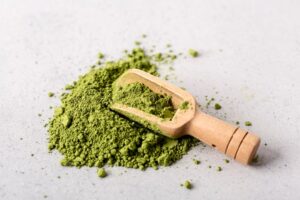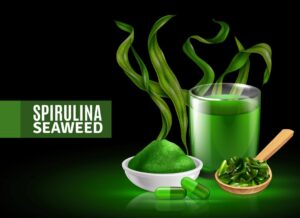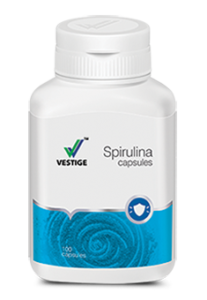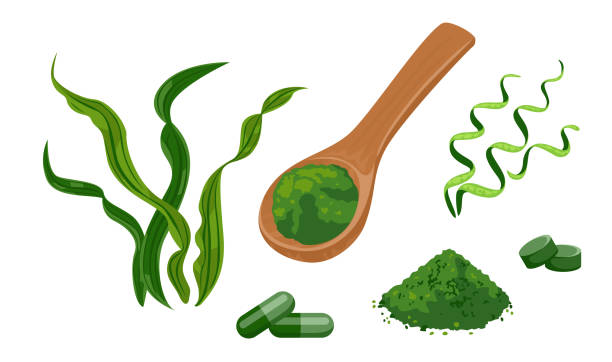Spirulina: A Natural Wonder for Wellness
Introduction
In recent years, the health and wellness industry has seen a surge in the popularity of superfoods, and one such nutritional powerhouse that has garnered significant attention is “Spirulina”. Often referred to as a “green superfood,” Spirulina is a type of cyanobacterium that has been consumed by various cultures for centuries. Its impressive nutrient profile and potential health benefits have led to its emergence as a popular dietary supplement and natural remedy. In this article, we will explore the origins, nutritional value, potential health benefits, various uses, side effects, precautions and warnings of Spirulina.

Dry Spirulina in Powder Form
What is Spirulina ?
Spirulina is a microscopic, spiral-shaped blue-green algae that grows in fresh or salt water. Its botanical name is Arthrospira and was once categorised under the genus Spirulina. The three species of Arthrospira (Spirulina) are Arthrospira platensis, A. fusiformis, and A. maxima. A. platensis occurs in Africa, Asia, and South America, whereas A. maxima is confined to Central America. It belongs to the Cyanobacteria family and is characterized by its deep green colour, which is attributed to the presence of chlorophyll and phycocyanin, two potent pigments.
Historical Use
Earlier Spirulina was consumed by the ancient Aztecs and other Mesoamericans until the 16th century. They harvested it from Lake Texcoco in Mexico. Later it became popular when NASA proposed that it could be grown and used in space by astronauts. It is also used as a feed supplement in the aquaculture, aquarium, and poultry industries.
Food & Nutritional Value
It is one of the world’s most popular supplements found in tablet or powder form. People use it for its health benefits, as it is rich in powerful nutrients and bears antioxidant properties. Nowadays people use it to boost the levels of nutrients and antioxidants in their bodies, and it may help protect against various diseases. Spirulina is often praised for its impressive nutritional content. It is a rich source of:
- Protein: Spirulina contains around 60-70% protein by dry weight, making it one of the most protein-dense foods available. This protein is also highly digestible, making it an excellent plant-based protein source.
- Vitamins: Spirulina is packed with essential vitamins, including B-complex vitamins (B1, B2, B3, B5, B6, B9 and B12), vitamin E, and vitamin K.
- Minerals: It is a good source of minerals such as iron, calcium, magnesium, manganese, phosphorus, zinc, sodium, and potassium.
- Antioxidants: Spirulina is abundant in antioxidants like beta-carotene, zeaxanthin, and phycocyanin, which help combat oxidative stress and reduce inflammation.
- Essential Fatty Acids: It contains essential fatty acids like gamma-linolenic acid (GLA), which can have various health benefits.
|
Nutritional value per 100 g (3.5 oz) |
|||||
| Energy | 1,213 kJ (290 kcal) | Phenylalanine | 2.777 g | Vitamin B12 | 0% (0 μg) |
| Carbohydrates | 23.9 g | Tyrosine | 2.584 g | Choline | 13% (66 mg) |
| Sugars | 3.1 g | Valine | 3.512 g | Vitamin C | 12% (10.1 mg) |
| Dietary Fiber | 3.6 g | Histidine | 1.085 g | Vitamin D | 0% (0 IU) |
| Fat | 7.72 g | Alanine | 4.515 g | Vitamin E | 33% (5 mg) |
| Saturated | 2.65 g | Aspartic acid | 5.793 g | Vitamin K | 24% (25.5 μg) |
| Monounsaturated | 0.675 g | Glutamic acid | 8.386 g | Minerals | Quantity (%DV) |
| Polyunsaturated | 2.08 g | Glycine | 3.099 g | Calcium | 12% (120 mg) |
| Protein | 57.47 g | Proline | 2.382 g | Iron | 219% (28.5 mg) |
| Tryptophan | 0.929 g | Serine | 2.998 g | Magnesium | 55% (195 mg) |
| Threonine | 2.97 g | Vitamins | Quantity (%DV) | Manganese | 90% (1.9 mg) |
| Isoleucine | 3.209 g | Thiamine (B1) | 207% (2.38 mg) | Phosphorus | 17% (118 mg) |
| Leucine | 4.947 g | Riboflavin (B2) | 306% (3.67 mg) | Potassium | 29% (1363 mg) |
| Lysine | 3.025 g | Niacin (B3) | 85% (12.82 mg) | Sodium | 70% (1048 mg) |
| Methionine | 1.149 g | Pantothenic acid (B5) | 70% (3.48 mg) | Zinc | 21% (2 mg) |
| Cystine | 0.662 g | Vitamin B6 | 28% (0.364 mg) | Other Constituents | Quantity |
| Arginine | 4.147 g | Folate (B9) | 24% (94 μg) | Water | 4.68 g |
Note: Units- μg= micrograms mg= milligrams IU=International Units
Source: USDA Food Data Central- https://fdc.nal.usda.gov/index.html
Uses and Benefits of Spirulina
1. Great Source of Proteins & Nutrients
Spirulina contains around 62% of Amino acids. Because it is a rich source of protein and other nutrients, it has been used as a nutritional supplement. In addition to high amount of Protein a tablespoon (tbsp) or 7 grams of dried Spirulina powder contains small amount of Carbohydrate, Fat (Omega-6 and Omega-3 Fatty acids), Fibre, Vitamins, Minerals like Copper, Iron, Magnesium, Potassium and Manganese.
2.Boosts Immunity
In many studies it has been shown that Spirulina improves immunity through the production of antibodies, infection-fighting proteins, and other cells. This can help ward off infection and chronic illnesses, such as cancer. However, it has not been tested in people.
3.Anti-oxidant and Anti-inflammatory properties
One of the main components of Spirulina is Phycocyanin, which gives it blue colour. It is an anti-oxidant which helps in fighting oxidative stress by blocking the production of molecules that promote inflammation. Thus, it keeps powerful anti-oxidant and anti-inflammatory properties.
4. Allergic Reactions
Spirulina is commonly used as an alternative remedy for alleviating symptoms of allergic rhinitis, running nose, watery eyes etc. and there is supporting evidence of it’s effectiveness. A study has indicated that Spirulina performed better than cetirizine (an antihistamine) typically used for allergy treatment, in terms of improving allergic rhinitis symptoms and reducing inflammation. However, it remains uncertain whether these initial findings will be beneficial for individuals dealing with allergies.
5. Lower cholesterol and triglyceride levels running nose
Spirulina may help lower the level of Cholesterol, Low Density Lipo-protein (LDL) or bad Cholesterol, and Triglycerides, while it also increases High Density Lipo-protein (HDL) or good Cholesterol, which ultimately lowers the risk factors for heart disease.
6. May reduce blood pressure
It has been observed in several studies that spirulina has the potential to enhance the production of nitric oxide and lower blood pressure. These studies suggest that consuming 1-8 grams of spirulina daily can lead to a notable reduction in both systolic and diastolic blood pressure, particularly in individuals with high blood pressure. This reduction is believed to be attributed to the increased production of nitric oxide, a signalling molecule that promotes relaxation and dilation of blood vessels.
7. May have anti-cancer properties
Spirulina may have anti-cancer properties. Studies in animals suggests that it may help reduce cancer progress and tumour size in cancer. However, more studies is needed.
8. Liver Disorders
While there is initial evidence indicating that Spirulina might offer protection against liver damage and cirrhosis in individuals with chronic hepatitis, it is essential to note that further research is needed to determine whether spirulina genuinely provides any significant benefits.
9. Effective against Anaemia
Anaemia is a prevalent issue among older adults, often resulting in persistent feelings of weakness and fatigue. Existing research points to the potential benefits of Spirulina in addressing anaemia in pregnant ladies and iron deficiency in children. In a 2020 study, it was observed that the consumption of Spirulina could lead to improvements in anaemia during the second trimester of pregnancy. Additionally, in 2021, researchers also noted its potential to alleviate iron deficiency in young children.
10. Eye Diseases
Spirulina is rich in zeaxanthin, a vital nutrient associated with maintaining good eye health. This suggests that spirulina might contribute to lowering the chances of developing cataracts and age-related macular degeneration. However, it’s important to note that additional research is required to confirm these potential benefits.
11. Improves Muscle Strength
Spirulina has the potential to offer several exercise-related advantages, such as improved endurance and increased muscle strength. Studies indicate that it may assist in reducing exercise-induced fatigue by enhancing both muscle strength and endurance. In a separate study, Spirulina supplementation demonstrated the ability to enhance oxygen uptake during arm cycling exercises, suggesting its potential as an ergogenic aid for enhancing athletic performance.
12. Supports Type2 Diabetes
Research suggests that spirulina could offer promising advantages to individuals grappling with type 2 diabetes, particularly in its ability to markedly decrease fasting blood sugar levels. An exhaustive review encompassing eight human studies unveiled that daily supplementation of Spirulina, at doses varying from 0.8 to 8 grams, demonstrated a substantial impact in reducing fasting blood sugar levels among those with type 2 diabetes. It’s crucial, however, to recognize that this effect did not extend to post-meal blood sugar levels or HbA1C levels, which provide insights into long-term blood sugar control.

Seaweed Sirulina used in various forms
Safety and Toxicity
Spirulina, classified as a cyanobacterium, belongs to a group that includes species capable of producing toxins like microcystins. The ingestion of microcystins has been associated with various gastrointestinal problems, such as diarrhoea, flatulence, headaches, muscle pain, and sweating. Prolonged and chronic usage of Spirulina may even lead to potential liver damage. Furthermore, concerns have been raised in China regarding the contamination of Spirulina supplements with heavy metals like lead, mercury, and arsenic.
It’s important to note that Spirulina itself does not inherently produce these toxic compounds. Rather, the risk arises when Spirulina batches become contaminated with other types of blue-green algae that can produce these toxins. Nonetheless, it is worth mentioning that Spirulina has been consumed safely at doses ranging from 10 to 19 grams per day over several months. Nevertheless, cautious sourcing and quality control remain essential to mitigate these potential risks associated with Spirulina consumption.
Side Effects
Spirulina is generally safe, but some people have reported the following with its use: Allergy, headache, muscle pain, sweating, trouble sleeping etc. While severe side effects from Spirulina are rare, but Anaphylaxis (severe allergic reaction), Throat swelling etc. may occur during it’s consumption. However, stop immediately using Spirulina if you experience any severe side effects, and contact your physician.
Precautions
Spirulina is usually safe to eat, even in large amounts. But sometimes, it might have harmful stuff mixed in. So, it’s a good idea to buy a trusted brand of spirulina to be safe.
If you have a rare condition called phenylketonuria (PKU), you shouldn’t have spirulina. This condition makes it hard for your body to process a certain amino acid called phenylalanine, which is found in spirulina.
If you have an autoimmune disease like multiple sclerosis, rheumatoid arthritis, or lupus, it’s best to steer clear of spirulina. There’s a chance it could make your immune system more active and worsen your condition.
Since there could be side effects or issues with other medicines you’re taking, it’s smart to only use dietary supplements when a knowledgeable physician is looking out for you.
Special Precautions and Warnings
Dangers Associated with Spirulina
Spirulina, often celebrated for its nutrient richness, is not without potential risks, and it’s essential to approach its consumption with caution. Here are some dangers associated with it:
Diabetes
Spirulina has shown the potential to impact blood sugar levels. This means that if you have diabetes and are considering Spirulina supplementation, it’s imperative to closely monitor your blood sugar levels.
Blood Clotting Problem
Spirulina possesses properties that can influence blood clotting. Hence, if you have a bleeding disorder or are on medications that affect blood clotting, it’s advisable to consult with a doctor before incorporating Spirulina into your routine.
Pregnancy and Breastfeeding Concerns
Due to the potential toxin risk associated with Spirulina, medical professionals often advise pregnant as well as breastfeeding women to avoid its use during these crucial phases.
Toxic Effects on some organs
Spirulina sourced from the wild can sometimes be tainted with heavy metals and bacteria. In higher concentrations, these contaminants may exert stress on the liver or even cause damage over time. Therefore, it’s prudent to be mindful of the source and quality of Spirulina supplements.
Vestige Spirulina
Vestige Spirulina Capsules contain a special kind of superfood supplement called Spirulina. It’s really good for you because it has lots of protein, iron, vitamins, minerals, and something called pro-vitamin A, which is like a superhero for your body. This Spirulina stuff also has natural things that fight aging, like a superhero for your skin. The pro-vitamin A in Spirulina takes care of your eyes and helps you feel calm when you are stressed. It even helps lower cholesterol and keeps your heart healthy. Basically, Spirulina gives your body everything it needs to stay strong and full of energy all day long.
Product Details
Product Name : VESTIGE SPIRULINA

Form : Capsules
Quantity : 100 Capsules
Shelf life (Best Before) : 36 months
Country of Origin : India
Company : Vestige Marketing Private Limited
Doses
Each capsule contains Algae Spirulina Powder 500 mg
Dosage
One capsule twice a day after meal or as prescribed by the physician.
Summary
Spirulina is a nutritional powerhouse that offers a wide array of health benefits due to its rich nutrient and antioxidant profile. While it is generally safe for consumption, it’s essential to source Spirulina from reputable suppliers (like Vestige) to ensure purity and quality. As with any dietary supplement or food, moderation is key, and individuals with specific health concerns should consult with a healthcare professional before adding Spirulina to their diet. Whether you’re looking to enhance your overall nutrition or explore a natural way to boost your health, Spirulina is undoubtedly a green superfood worth considering.
Source/References
1.Wikipedia- https://en.wikipedia.org/wiki/Spirulina_(dietary_supplement)
2.USDA Food Data Central- https://fdc.nal.usda.gov/index.html
3.https://www.healthline.com/nutrition/10-proven-benefits-of-spirulina
4.https://www.medicalnewstoday.com/articles/324027
5.https://www.verywellhealth.com/spirulina-89079
Legal Disclaimer
The information on this website is for learning purposes only and is not a replacement for medical advice from a healthcare professional. Since everyone’s needs are different, it’s important to consult with your doctor to see if the information here is suitable for your situation.
Suppliers who list their products on healwellbeauty.com are responsible for making sure the product information is accurate. You should use these products in a safe and lawful way and avoid any illegal activities. The actual product packaging, materials, and design might have more or different details compared to what’s shown here, including things like nutritional information, statements, usage instructions, warnings, and disclaimers.
We recommend reading the product label before using or consuming any products and not relying solely on the information provided on healwellbeauty.com. Before you make any changes to your healthcare plan or treatment, like starting, stopping, or altering anything that your doctor has recommended, it’s important to have a conversation with your doctor or healthcare professional. They can help you figure out the best therapy or course of action for your specific needs. We are not responsible for any side effects, losses, claims, damages, or injuries that might occur from the improper or illegal use of products sold by our suppliers on healwellbeauty.com.
© 2023 healwellbeauty.com All Rights Reserved. Unauthorized reproduction, distribution, or use of this content is prohibited.

Leave a Reply